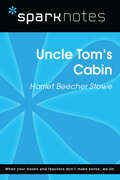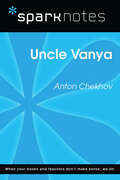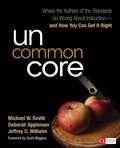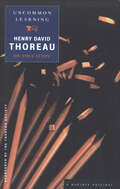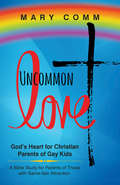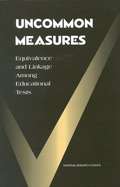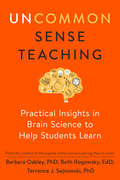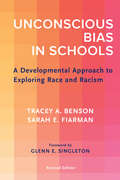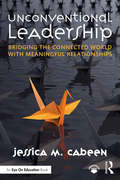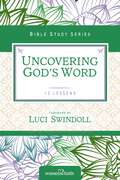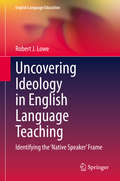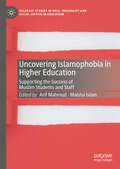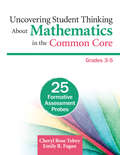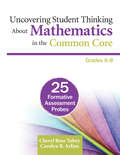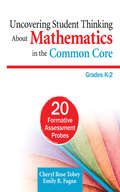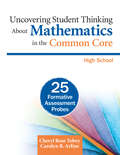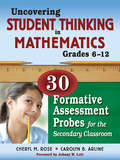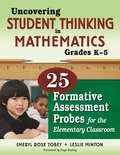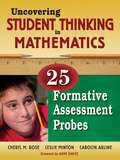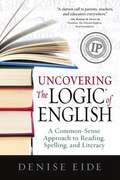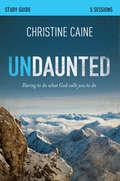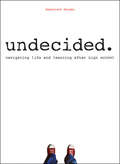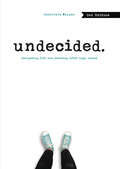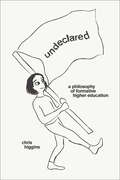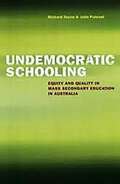- Table View
- List View
Uncle Tom's Cabin (SparkNotes Literature Guide Series)
by SparkNotesUncle Tom's Cabin (SparkNotes Literature Guide) by Harriet Beecher Stowe Making the reading experience fun! Created by Harvard students for students everywhere, SparkNotes is a new breed of study guide: smarter, better, faster. Geared to what today's students need to know, SparkNotes provides: *Chapter-by-chapter analysis *Explanations of key themes, motifs, and symbols *A review quiz and essay topicsLively and accessible, these guides are perfect for late-night studying and writing papers
Uncle Vanya (SparkNotes Literature Guide Series)
by SparkNotesUncle Vanya (SparkNotes Literature Guide) by Anton Chekhov Making the reading experience fun! Created by Harvard students for students everywhere, SparkNotes is a new breed of study guide: smarter, better, faster. Geared to what today's students need to know, SparkNotes provides: *Chapter-by-chapter analysis *Explanations of key themes, motifs, and symbols *A review quiz and essay topicsLively and accessible, these guides are perfect for late-night studying and writing papers
Uncommon Core: Where the Authors of the Standards Go Wrong About Instruction-and How You Can Get It Right
by Michael W. Smith Jeffrey D. Wilhelm Deborah ApplemanLeave instruction to the experts! Uncommon Core puts us on high-alert about some outright dangerous misunderstandings looming around so-called “standards-aligned” instruction, then shows us how to steer past them—all in service of meeting the real intent of the Common Core. It counters with teaching suggestions that are true to the research and true to our students, including how: Reader-based approaches can complement text-based ones Prereading activities can help students meet the strategic and conceptual demands of texts Strategy instruction can result in a careful and critical analysis of text while providing transferable understandings Inquiry units around essential questions can generate meaningful conversation and higher-order thinking
Uncommon Learning: Henry David Thoreau on Education (Spirit of Thoreau)
by Henry David Thoreau"It is only when we forget our learning that we begin to know," Thoreau wrote. Ideas about education permeate Thoreau's writing. Uncommon Learning brings those ideas together in a single volume for the first time.
Uncommon Love: God's Heart for Christian Parents of Gay Kids
by Mary CommUncommon Love is a landmark Bible study and the first of its kind. In a culture where gay rights, gay marriage, and a surplus of gender issues have recently exploded in the media, more and more kids are coming out—and many of these are from Christian homes with Christian parents who don&’t know what to do, how to respond, where to draw boundaries or if they even should. Scripture, which is the foundational basis for how to live the Christian life, has even been brought into question, further confusing the hearts and minds of Christian parents. Mary Comm presents a comprehensive navigational map for Christian parents whose kids (whether minor or adult) have Same-Sex Attraction or are living the LGB lifestyle. The primary purpose of Uncommon Love is to help parents maintain a loving, mutually respectful relationship with their LGB children and shows parents how to offer compassionate understanding and unconditional love without compromising their own identity, faith, and values.
Uncommon Measures: Equivalence and Linkage Among Educational Tests
by National Research CouncilThe issues surrounding the comparability of various tests used to assess performance in schools received broad public attention during congressional debate over the Voluntary National Tests proposed by President Clinton in his 1997 State of the Union Address. Proponents of Voluntary National Tests argue that there is no widely understood, challenging benchmark of individual student performance in 4th-grade reading and 8th-grade mathematics, thus the need for a new test. Opponents argue that a statistical linkage among tests already used by states and districts might provide the sort of comparability called for by the president's proposal.Public Law 105-78 requested that the National Research Council study whether an equivalency scale could be developed that would allow test scores from existing commercial tests and state assessments to be compared with each other and with the National Assessment of Education Progress.In this book, the committee reviewed research literature on the statistical and technical aspects of creating valid links between tests and how the content, use, and purposes of education testing in the United States influences the quality and meaning of those links. The book summarizes relevant prior linkage studies and presents a picture of the diversity of state testing programs. It also looks at the unique characteristics of the National Assessment of Educational Progress.Uncommon Measures provides an answer to the question posed by Congress in Public Law 105-78, suggests criteria for evaluating the quality of linkages, and calls for further research to determine the level of precision needed to make inferences about linked tests. In arriving at its conclusions, the committee acknowledged that ultimately policymakers and educators must take responsibility for determining the degree of imprecision they are willing to tolerate in testing and linking. This book provides science-based information with which to make those decisions.
Uncommon Sense Teaching: Practical Insights in Brain Science to Help Students Learn
by Terrence J. Sejnowski Barbara Oakley Beth RogowskyA groundbreaking guide to improve teaching based on the latest research in neuroscience, from the bestselling author of A Mind for Numbers.Neuroscientists and cognitive scientists have made enormous strides in understanding the brain and how we learn, but little of that insight has filtered down to the way teachers teach. Uncommon Sense Teaching applies this research to the classroom for teachers, parents, and anyone interested in improving education. Topics include: • keeping students motivated and engaged, especially with online learning • helping students remember information long-term, so it isn't immediately forgotten after a test • how to teach inclusively in a diverse classroom where students have a wide range of abilitiesDrawing on research findings as well as the authors' combined decades of experience in the classroom, Uncommon Sense Teaching equips readers with the tools to enhance their teaching, whether they're seasoned professionals or parents trying to offer extra support for their children's education.
Unconscious Bias in Schools: A Developmental Approach to Exploring Race and Racism, Revised Edition
by Tracey A. Benson Sarah E. FiarmanIn Unconscious Bias in Schools, two seasoned educators describe the phenomenon of unconscious racial bias and how it negatively affects the work of educators and students in schools. &“Regardless of the amount of effort, time, and resources education leaders put into improving the academic achievement of students of color,&” the authors write, &“if unconscious racial bias is overlooked, improvement efforts may never achieve their highest potential.&” In order to address this bias, the authors argue, educators must first be aware of the racialized context in which we live. Through personal anecdotes and real-life scenarios, Unconscious Bias in Schools provides education leaders with an essential roadmap for addressing these issues directly. The authors draw on the literature on change management, leadership, critical race theory, and racial identity development, as well as the growing research on unconscious bias in a variety of fields, to provide guidance for creating the conditions necessary to do this work—awareness, trust, and a &“learner&’s stance.&” Benson and Fiarman also outline specific steps toward normalizing conversations about race; reducing the influence of bias on decision-making; building empathic relationships; and developing a system of accountability. All too often, conversations about race become mired in questions of attitude or intention–&“But I&’m not a racist!&” This book shows how information about unconscious bias can help shift conversations among educators to a more productive, collegial approach that has the potential to disrupt the patterns of perception that perpetuate racism and institutional injustice.Tracey A. Benson is an assistant professor of educational leadership at the University of North Carolina at Charlotte. Sarah E. Fiarman is the director of leadership development for EL Education, and a former public school teacher, principal, and lecturer at Harvard Graduate School of Education.
Unconventional Leadership: Bridging the Connected World with Meaningful Relationships
by Jessica M. CabeenToday’s educational leaders are working with more resources, more research, and more stakeholders – all within the same, limited time in a day as we had a decade ago. Author Jessica M. Cabeen takes readers through an intentional journey of current trends and buzzwords, helping leaders understand how social media is a tool for connection, collaboration, and learning. This exciting book explores the importance of care and collaboration with all members of the educational community – students, teachers, staff, families, and community partners. Each chapter highlights examples of leaders that have made positive change in their schools, and provides key actionable strategies that can be implemented at a pace that is sustainable and tailored to fit your needs. You will discover a deeper understanding of the critical importance of your role in: Elevating the student’s experience Building a strong school culture Creating small ways to make big impacts with families Advocating a clear message with community partners and legislative leaders Creating time for self-care Filled with practical examples, tools, and strategies, Unconventional Leadership is a resource school leaders can pick up today and implement tomorrow.
Uncovering God's Word (Women of Faith Study Guide Series)
by Luci Swindoll Women Of FaithFor many of us, reading the Bible--much less studying it--is daunting. The language is archaic, the stories are violent, and it's difficult to know the takeaways. But the truth is the Bible is critical, because it is the means by which we know God, experience His love, and understand what He expects from us. In Uncovering God's Word, you will explore practical ways to dive into the content of Scripture and apply it to your life. You will examine what the Bible says about itself, why it is important to know it by heart, and how it reveals what is truly important in life. You will also see why reading the Bible on a daily basis is fundamental for you to mature in Christ and develop your relationship with God. The Women of Faith® Bible Studies provide intriguing insights into topics that are relevant to women's lives today. Each guide includes twelve weeks of study, down-to-earth illustrations, and reflections to help you move the truth from your head to your heart. A leader's guide for use with small groups is also included.
Uncovering Ideology in English Language Teaching: Identifying the 'Native Speaker' Frame (English Language Education #19)
by Robert J. LoweThis book introduces the concept of the ‘native speaker’ frame: a perceptual filter within English Language Teaching (ELT) which views the linguistic and cultural norms and the educational technology of the anglophone West as being normative, while the norms and practices of non-Western countries are viewed as deficient. Based on a rich source of ethnographic data, and employing a frame analysis approach, it investigates the ways in which this ‘native-speaker’ framing influenced the construction and operation of a Japanese university EFL program. While the program appeared to be free of explicit expressions of native-speakerism, such as discrimination against teachers, this study found that the practices of the program were underpinned by implicitly native-speakerist assumptions based on the stereotyping of Japanese students and the Japanese education system. The book provides a new perspective on debates around native-speakerism by examining how the dominant framing of a program may still be influenced by the ideology, even in cases where overt signs of native-speakerism appear to be absent.
Uncovering Islamophobia in Higher Education: Supporting the Success of Muslim Students and Staff (Palgrave Studies in Race, Inequality and Social Justice in Education)
by Arif Mahmud Maisha IslamThis edited collection documents the experiences of Muslim students and staff in UK higher education (HE), including their expertise and experiences in teaching, scholarship, policy and academic transitions as professionals, academics and students. At a time when UK HE at large is attempting to redress myriad racial and social injustices, this collection highlights how this meaningfully applies to Muslim students and staff who find themselves at the nexus of multiple, intersectional oppressions. The chapters presented, all written by Muslim authors, describe the inequalities faced by students and staff at all levels of their educational and professional journeys, exposing the fluid manifestations of Islamophobia within HE structures and institutions. Critically, the book advocates for hope by offering tools that universities and sector bodies can utilise to tackle challenging and nuanced cycles of inequity. This timely volume is essential reading for students, academics, professional service staff, and policymakers leading on diversity, equity and inclusion research, activity and interventions, or those within the sector who wish for it to become more equitable.
Uncovering Student Thinking About Mathematics in the Common Core, Grades 3-5: 25 Formative Assessment Probes
by Cheryl Rose Tobey Emily R. FaganTake the guesswork out of grades 3-5 math assessment! Quickly pinpoint and reverse your students’ common math difficulties with this detailed and easy-to-follow resource from best-selling authors Cheryl Tobey and Carolyn Arline. Twenty research-based assessment probes help you ask the right questions to uncover just where your students get confused – while learning is already underway. These CCSM-aligned probes eliminate all guesswork and will help you: Systematically address conceptual and procedural mistakes Plan targeted instruction and remediation in multiplication and division, problem solving, the four operations, factorization, and beyond Master essential CCSM mathematical processes and proficiencies for Grades 3-5
Uncovering Student Thinking About Mathematics in the Common Core, Grades 6-8: 25 Formative Assessment Probes
by Cheryl Rose Tobey Carolyn B. ArlinePinpoint and reverse math misconceptions with laser-like accuracy Here’s the middle-grades math resource you’ve been waiting for! Bestselling authors Cheryl Tobey and Carolyn Arline are back with 25 entirely new assessment probes that pinpoint subconcepts within the new Common Core Standards for Mathematics to promote deep learning and expert math instruction. Learn to ask the right questions to uncover common student misconceptions. Get practical instructional ideas that build new and accurate skills--while learning is already underway. It’s all here in this detailed and grade-level specific guide. Organized by strand, the probes will enable you to: Quickly and objectively evaluate common misconceptions around fractions and decimals, linear equations, ratios and percents, statistics, and more Systematically address conceptual misunderstandings and procedural mistakes--before they become long-term problems Help students better understand areas of difficulty Plan targeted instruction that builds on students’ current understandings while addressing areas of struggle Master the essential CCSM mathematical processes and proficiencies for Grades 6-8 You’ll find sample student responses, extensive Teacher Notes, and research-based tips and resources. Eliminate the guesswork and join thousands of busy middle-grades teachers who’ve used these easy-to-implement tools to foster solid math proficiency! "This book will definitely help mathematics teachers now that the CCSS are becoming such a big part of our teaching." —Debra A. Scarpelli, Middle School Mathematics Teacher RIMLE President, PARCC/CCSS ELC Cadre for Rhode Island, and Adjunct Professor
Uncovering Student Thinking About Mathematics in the Common Core, Grades K–2: 20 Formative Assessment Probes
by Cheryl Rose Tobey Emily R. FaganGet to the core of your students’ understanding of math! Quickly and reliably identify your primary students’ math knowledge with these convenient and easy-to-implement diagnostic tools! Tobey and Fagan provide 25 new assessments specifically for Grades K–2 and directly aligned with the Common Core. Organized by strand, the probes will enable you to: Quickly and objectively evaluate each child’s prior knowledge of basic math and numeracy Systematically address common mistakes and obstacles before they become long-term problems Make sound instructional choices to improve all students’ math skills
Uncovering Student Thinking About Mathematics in the Common Core, High School: 25 Formative Assessment Probes
by Cheryl Rose Tobey Carolyn B. ArlineTake the guesswork out of high school math instruction! Quickly and reliably uncover common math misconceptions in Grades 9-12 with these convenient and easy-to-implement diagnostic tools! Bestselling authors Cheryl Rose Tobey and Carolyn B. Arline provide 25 new assessment probes that pinpoint subconcepts within the Common Core State Standards to promote deep learning and expert math instruction—all while learning is underway. Completely Common Core aligned, these grade-specific probes eliminate the guesswork and will help you Systematically address conceptual and procedural mistakes Pinpoint where students are struggling Plan targeted instruction in algebra, functions, logarithms, geometry, trigonometric ratios, statistics and probability, and more
Uncovering Student Thinking in Mathematics, Grades 6-12: 30 Formative Assessment Probes for the Secondary Classroom
by Cheryl Rose Tobey Carolyn B. ArlineDiscussing standards, research, and more, these 30 probes help secondary teachers assess students' grasp of core mathematics concepts and modify their instruction to improve student achievement.
Uncovering Student Thinking in Mathematics, Grades K-5: 25 Formative Assessment Probes for the Elementary Classroom
by Cheryl Rose Tobey Leslie G. MintonThis book provides 25 easily administered assessments of learners' math knowledge that help teachers monitor learning in real time and improve all students' math skills.
Uncovering Student Thinking in Mathematics: 25 Formative Assessment Probes
by Cheryl Rose Tobey Leslie G. Minton Carolyn B. ArlineAppropriate for all grade levels, these 25 field-tested, easy-to-use mathematics assessment probes help teachers modify instruction by determining students' understanding of core mathematical concepts.
Uncovering the Logic of English: A Common-Sense Approach to Reading, Spelling, and Literacy
by Denise EideMultiple award-winning book on reading and spelling education that will transform how you think about English! Do you know a student who is good at math or science but struggles with reading or spelling? Has a student ever asked you a question about English spelling to which you replied, "That's an exception"? Have you ever abandoned a word while writing because spell check didn't recognize it? Discover this revolutionary method that Dr. Temple Grandin called "really helpful for teaching reading to children who are mathematical pattern thinkers..." Predominant reading methods require students to break the complex code of English without help. This has resulted in low literacy rates and explains why many highly educated professionals cannot spell. By revealing the logical patterns underlying 98% of English words, Uncovering the Logic of English eliminates the need to guess and provides a logical solution to English spelling. Simple answers are given for questions such as: Why is there a silent final E in have? Why don't we drop the E in noticeable? Why is discussion spelled with -sion rather than -tion? As the rules unfold it becomes apparent how this knowledge is vital to reversing the educational crisis that is plaguing America. This slim volume is easy to read and accessible to parents and classroom teachers. A thorough appendix summarizes the most important concepts for quick reference.
Undaunted Study Guide: Daring to Do What God Calls You to Do
by Sherry Harney Christine CaineChristine Caine offers life-transforming insights about how not only to overcome the challenges, wrong turns, and often painful circumstances we all experience, but also to actually grow from those experiences and be equipped and empowered to help others. Using her own dramatic life story, Caine shows how God rescued her from a life where she was unnamed, unwanted, and unqualified. She tells how she overcame abuse, abandonment, fears, and other challenges to go on a mission of adventure, fueled by faith and filled with love and courage. Her personal stories inspire readers to hear their name called, just as Christine heard her own—“You are beloved. You are the hope. You are chosen”—to go into a dark and troubled world, knowing each of us possess all it takes to bring hope, create change, and live completely for Christ. Part inspirational tale, part manifesto to stir readers to lives of adventure, Your God Is So Big! shows the way with spiritual wisdom and insight. Her mission to fight injustice by focusing on one person at a time will inspire and awe readers to see how we are joined in a unique mission, products of eternity, positioned in time, pressed to make the most of our lives on a quest filled with adventure and drawn by faith.
Undecided
by Genevieve MorganFor high school students all over the country, figuring out what to do after graduation is a major question. For many, the logical answer is continuing their education, whether in a training program, a community college, or a four-year university. But no matter what the path, the preparation can be overwhelming, and it's hard to know where to start. That's where Undecided comes in! This comprehensive handbook outlines the different options available to teens after high school and provides suggestions on how to follow each path efficiently and successfully. It covers everything from SAT preparation and personal statements to trade school pros and cons and advice on how to prepare for life in the military. Full of checklists, anecdotes, brainstorming activities, and journal exercises, Undecided leaves no stone unturned and no option unconsidered. So settle in, keep an open mind, and find the future that really works for you!
Undecided, 2nd Edition: Navigating Life and Learning after High School
by Genevieve MorganCut through the chaos and find the path that’s right for you! Deciding what to do after high school is one of the biggest decisions you’ll ever make. And that’s a lot of pressure to deal with (especially when everyone else is telling you what they think you should be doing)! Undecided will help you come to grips with this often-overwhelming time of transition by putting the decision-making power back where it belongs: with you. Undecided begins by helping students think seriously about who they are and what they want and then moves on to dissect the various options that are available after high school, such as enrolling in a training program, attending a community college, taking a gap year, enlisting in the military, pursuing a traditional four-year degree, and more. It also takes an in-depth look at how to manage student debt, what you can expect to earn, the kind of lifestyle you may lead, and the possible pitfalls of all of these scenarios. Full of checklists, anecdotes, brainstorming activities, and journal exercises, this book will help you stop procrastinating, put your stress aside, and get busy living.
Undeclared: A Philosophy of Formative Higher Education
by Chris HigginsAn imaginative tour of the contemporary university as it could be: a place to discover self-knowledge, meaning, and purpose.What if college were not just a means of acquiring credentials, but a place to pursue our formation as whole persons striving to lead lives of meaning and purpose? In Undeclared, Chris Higgins confronts the contemporary university in a bid to reclaim a formative mission for higher education. In a series of searching essays and pointed interludes, Higgins challenges us to acknowledge how far our practices have drifted from our ideals, asking: What would it look like to build a college from the ground up to support self-discovery and personal integration? What does it mean to be a public university, and are there any left? How can the humanities help the job-ified university begin to take vocation seriously?Cutting through the underbrush of received ideas, Higgins follows the insight where it leads, clearing a path from the corporate multiversity to the renaissance in higher education that was Black Mountain College and back again. Along the way, we tour a campus bent on becoming a shopping mall, accompany John Dewey through a midlife crisis, and witness the first "happening.&” Through diverse and grounded philosophical engagements, Undeclared assembles the resources to expand the contemporary educational imagination.
Undemocratic Schooling: Equity and Quality in Mass Secondary Education in Australia
by Richard Teese John Polesel-Half the boys living in working-class suburbs to the west and north of Melbourne fail mathematics. Why? -Why are so many young people leaving school early, when there are no jobs for them to go to? -Are boys disadvantaged at school in comparison with girls? -What makes good schools work? -Is the best university one that attracts the top students, or one that offers the best chances for lower-achieving students? This groundbreaking book is based on the largest social survey of secondary education ever undertaken in Australia. It presents a comprehensive picture of who succeeds and who fails at school. Undemocratic Schooling brings together a unique range of information on who our students are, what they want from school, how well they think their schools work, what subjects they study, how well they succeed, and where they end up. It also reveals their larger views on matters such as jobs, careers, marriage and family, the political system and social justice. In its imaginative presentation of the findings of this massive survey, this book sheds new light on inequalities in our education system. It reveals significant new information on: -students' achievements in relation to their attitudes and values -students' perspectives on issues from jobs to discrimination -students' destinations in relation to their backgrounds. The authors offer valuable angles on such topical issues as retention and dropout rates; the relation between poverty and achievement; the gender debate; private versus public schools; and which universities serve which social groups.
